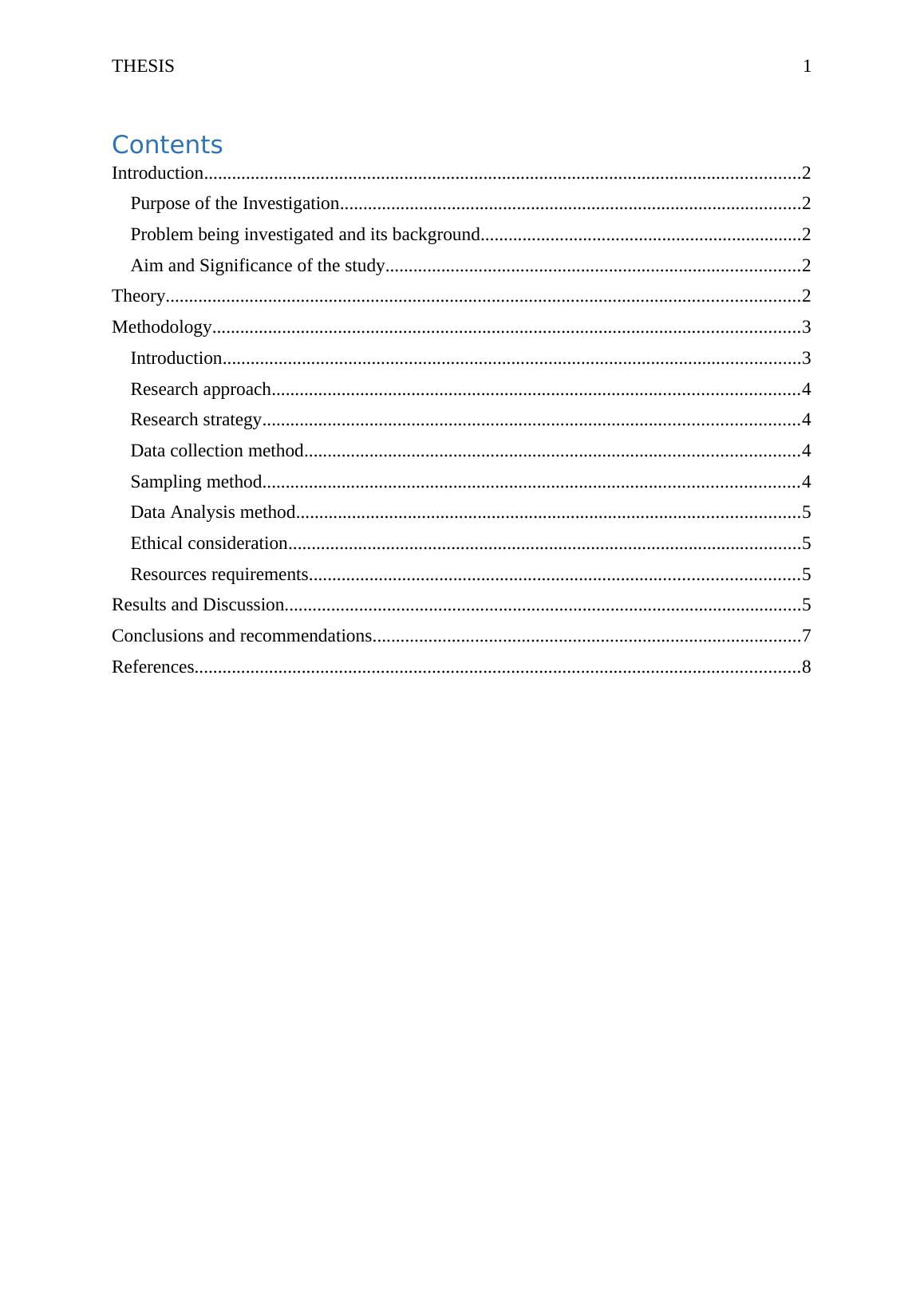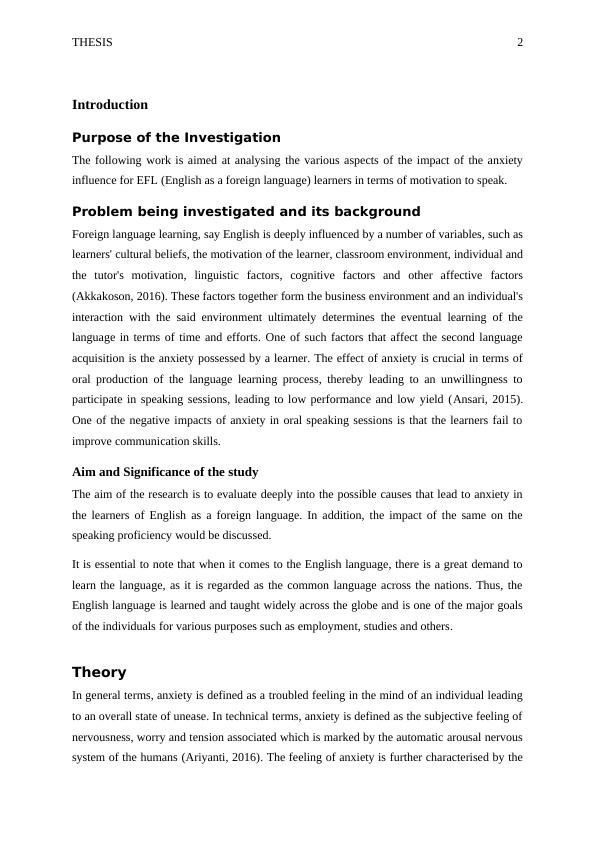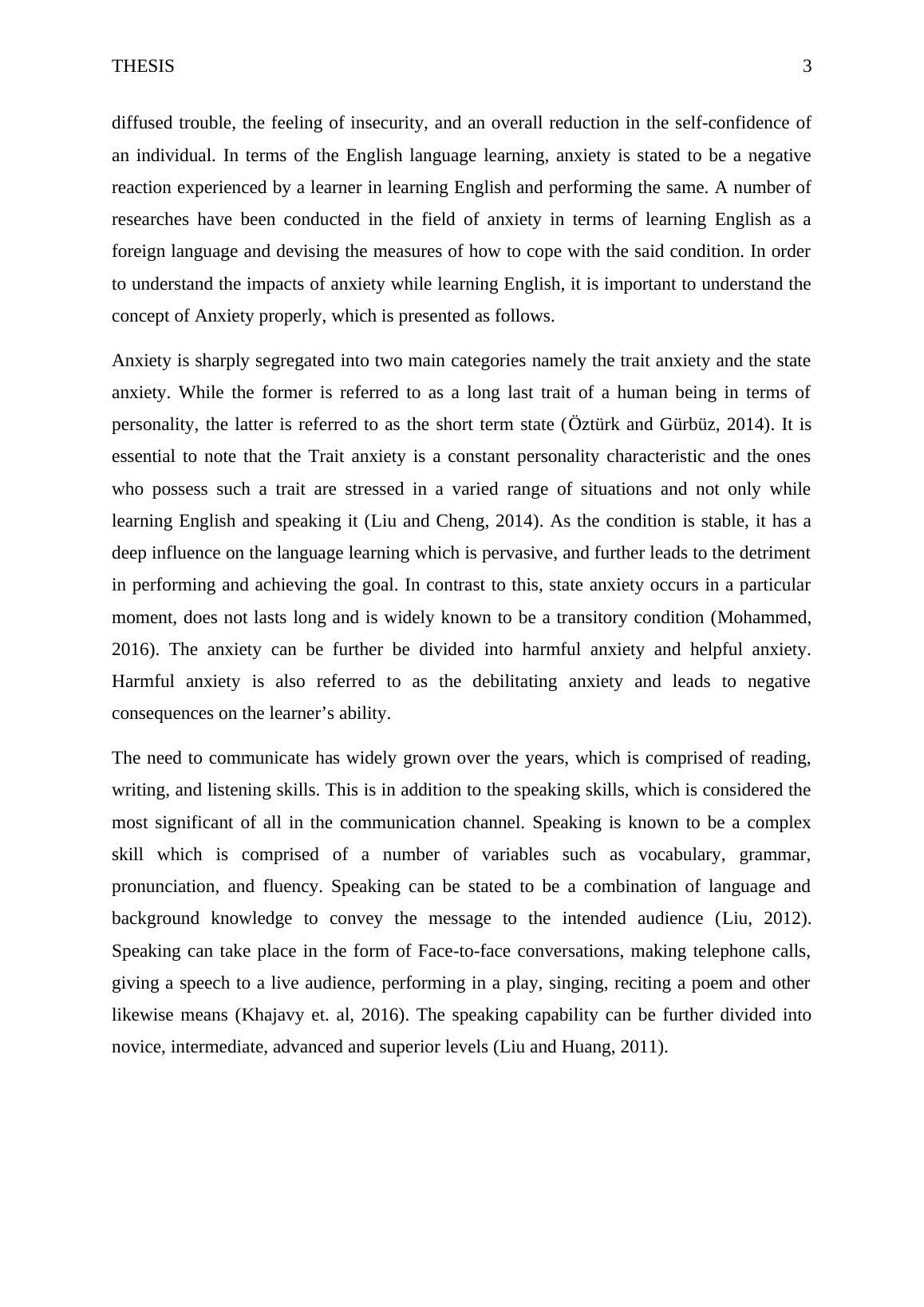Impact of Anxiety on EFL Learners' Speaking Proficiency
11 Pages2441 Words251 Views
Added on 2023-04-07
About This Document
This thesis explores the impact of anxiety on English as a foreign language (EFL) learners' motivation to speak and their speaking proficiency. It discusses the causes of anxiety, its effects on language learning, and provides recommendations for teachers and learners to overcome anxiety.
Impact of Anxiety on EFL Learners' Speaking Proficiency
Added on 2023-04-07
ShareRelated Documents
ENGLISH
THESIS
THESIS

THESIS 1
Contents
Introduction................................................................................................................................2
Purpose of the Investigation...................................................................................................2
Problem being investigated and its background.....................................................................2
Aim and Significance of the study.........................................................................................2
Theory........................................................................................................................................2
Methodology..............................................................................................................................3
Introduction............................................................................................................................3
Research approach.................................................................................................................4
Research strategy...................................................................................................................4
Data collection method..........................................................................................................4
Sampling method...................................................................................................................4
Data Analysis method............................................................................................................5
Ethical consideration..............................................................................................................5
Resources requirements.........................................................................................................5
Results and Discussion...............................................................................................................5
Conclusions and recommendations............................................................................................7
References..................................................................................................................................8
Contents
Introduction................................................................................................................................2
Purpose of the Investigation...................................................................................................2
Problem being investigated and its background.....................................................................2
Aim and Significance of the study.........................................................................................2
Theory........................................................................................................................................2
Methodology..............................................................................................................................3
Introduction............................................................................................................................3
Research approach.................................................................................................................4
Research strategy...................................................................................................................4
Data collection method..........................................................................................................4
Sampling method...................................................................................................................4
Data Analysis method............................................................................................................5
Ethical consideration..............................................................................................................5
Resources requirements.........................................................................................................5
Results and Discussion...............................................................................................................5
Conclusions and recommendations............................................................................................7
References..................................................................................................................................8

THESIS 2
Introduction
Purpose of the Investigation
The following work is aimed at analysing the various aspects of the impact of the anxiety
influence for EFL (English as a foreign language) learners in terms of motivation to speak.
Problem being investigated and its background
Foreign language learning, say English is deeply influenced by a number of variables, such as
learners' cultural beliefs, the motivation of the learner, classroom environment, individual and
the tutor's motivation, linguistic factors, cognitive factors and other affective factors
(Akkakoson, 2016). These factors together form the business environment and an individual's
interaction with the said environment ultimately determines the eventual learning of the
language in terms of time and efforts. One of such factors that affect the second language
acquisition is the anxiety possessed by a learner. The effect of anxiety is crucial in terms of
oral production of the language learning process, thereby leading to an unwillingness to
participate in speaking sessions, leading to low performance and low yield (Ansari, 2015).
One of the negative impacts of anxiety in oral speaking sessions is that the learners fail to
improve communication skills.
Aim and Significance of the study
The aim of the research is to evaluate deeply into the possible causes that lead to anxiety in
the learners of English as a foreign language. In addition, the impact of the same on the
speaking proficiency would be discussed.
It is essential to note that when it comes to the English language, there is a great demand to
learn the language, as it is regarded as the common language across the nations. Thus, the
English language is learned and taught widely across the globe and is one of the major goals
of the individuals for various purposes such as employment, studies and others.
Theory
In general terms, anxiety is defined as a troubled feeling in the mind of an individual leading
to an overall state of unease. In technical terms, anxiety is defined as the subjective feeling of
nervousness, worry and tension associated which is marked by the automatic arousal nervous
system of the humans (Ariyanti, 2016). The feeling of anxiety is further characterised by the
Introduction
Purpose of the Investigation
The following work is aimed at analysing the various aspects of the impact of the anxiety
influence for EFL (English as a foreign language) learners in terms of motivation to speak.
Problem being investigated and its background
Foreign language learning, say English is deeply influenced by a number of variables, such as
learners' cultural beliefs, the motivation of the learner, classroom environment, individual and
the tutor's motivation, linguistic factors, cognitive factors and other affective factors
(Akkakoson, 2016). These factors together form the business environment and an individual's
interaction with the said environment ultimately determines the eventual learning of the
language in terms of time and efforts. One of such factors that affect the second language
acquisition is the anxiety possessed by a learner. The effect of anxiety is crucial in terms of
oral production of the language learning process, thereby leading to an unwillingness to
participate in speaking sessions, leading to low performance and low yield (Ansari, 2015).
One of the negative impacts of anxiety in oral speaking sessions is that the learners fail to
improve communication skills.
Aim and Significance of the study
The aim of the research is to evaluate deeply into the possible causes that lead to anxiety in
the learners of English as a foreign language. In addition, the impact of the same on the
speaking proficiency would be discussed.
It is essential to note that when it comes to the English language, there is a great demand to
learn the language, as it is regarded as the common language across the nations. Thus, the
English language is learned and taught widely across the globe and is one of the major goals
of the individuals for various purposes such as employment, studies and others.
Theory
In general terms, anxiety is defined as a troubled feeling in the mind of an individual leading
to an overall state of unease. In technical terms, anxiety is defined as the subjective feeling of
nervousness, worry and tension associated which is marked by the automatic arousal nervous
system of the humans (Ariyanti, 2016). The feeling of anxiety is further characterised by the

THESIS 3
diffused trouble, the feeling of insecurity, and an overall reduction in the self-confidence of
an individual. In terms of the English language learning, anxiety is stated to be a negative
reaction experienced by a learner in learning English and performing the same. A number of
researches have been conducted in the field of anxiety in terms of learning English as a
foreign language and devising the measures of how to cope with the said condition. In order
to understand the impacts of anxiety while learning English, it is important to understand the
concept of Anxiety properly, which is presented as follows.
Anxiety is sharply segregated into two main categories namely the trait anxiety and the state
anxiety. While the former is referred to as a long last trait of a human being in terms of
personality, the latter is referred to as the short term state (Öztürk and Gürbüz, 2014). It is
essential to note that the Trait anxiety is a constant personality characteristic and the ones
who possess such a trait are stressed in a varied range of situations and not only while
learning English and speaking it (Liu and Cheng, 2014). As the condition is stable, it has a
deep influence on the language learning which is pervasive, and further leads to the detriment
in performing and achieving the goal. In contrast to this, state anxiety occurs in a particular
moment, does not lasts long and is widely known to be a transitory condition (Mohammed,
2016). The anxiety can be further be divided into harmful anxiety and helpful anxiety.
Harmful anxiety is also referred to as the debilitating anxiety and leads to negative
consequences on the learner’s ability.
The need to communicate has widely grown over the years, which is comprised of reading,
writing, and listening skills. This is in addition to the speaking skills, which is considered the
most significant of all in the communication channel. Speaking is known to be a complex
skill which is comprised of a number of variables such as vocabulary, grammar,
pronunciation, and fluency. Speaking can be stated to be a combination of language and
background knowledge to convey the message to the intended audience (Liu, 2012).
Speaking can take place in the form of Face-to-face conversations, making telephone calls,
giving a speech to a live audience, performing in a play, singing, reciting a poem and other
likewise means (Khajavy et. al, 2016). The speaking capability can be further divided into
novice, intermediate, advanced and superior levels (Liu and Huang, 2011).
diffused trouble, the feeling of insecurity, and an overall reduction in the self-confidence of
an individual. In terms of the English language learning, anxiety is stated to be a negative
reaction experienced by a learner in learning English and performing the same. A number of
researches have been conducted in the field of anxiety in terms of learning English as a
foreign language and devising the measures of how to cope with the said condition. In order
to understand the impacts of anxiety while learning English, it is important to understand the
concept of Anxiety properly, which is presented as follows.
Anxiety is sharply segregated into two main categories namely the trait anxiety and the state
anxiety. While the former is referred to as a long last trait of a human being in terms of
personality, the latter is referred to as the short term state (Öztürk and Gürbüz, 2014). It is
essential to note that the Trait anxiety is a constant personality characteristic and the ones
who possess such a trait are stressed in a varied range of situations and not only while
learning English and speaking it (Liu and Cheng, 2014). As the condition is stable, it has a
deep influence on the language learning which is pervasive, and further leads to the detriment
in performing and achieving the goal. In contrast to this, state anxiety occurs in a particular
moment, does not lasts long and is widely known to be a transitory condition (Mohammed,
2016). The anxiety can be further be divided into harmful anxiety and helpful anxiety.
Harmful anxiety is also referred to as the debilitating anxiety and leads to negative
consequences on the learner’s ability.
The need to communicate has widely grown over the years, which is comprised of reading,
writing, and listening skills. This is in addition to the speaking skills, which is considered the
most significant of all in the communication channel. Speaking is known to be a complex
skill which is comprised of a number of variables such as vocabulary, grammar,
pronunciation, and fluency. Speaking can be stated to be a combination of language and
background knowledge to convey the message to the intended audience (Liu, 2012).
Speaking can take place in the form of Face-to-face conversations, making telephone calls,
giving a speech to a live audience, performing in a play, singing, reciting a poem and other
likewise means (Khajavy et. al, 2016). The speaking capability can be further divided into
novice, intermediate, advanced and superior levels (Liu and Huang, 2011).

End of preview
Want to access all the pages? Upload your documents or become a member.
Related Documents
Oral Communication Skills | Literature Reviewlg...
|10
|2594
|31
Motivating Non-Native Teachers to Use EMI in Writing Classes for Higher English Proficiency in Rural Punjablg...
|21
|1031
|162
Challenges Faced by English Language Learners and Teachers in ESL Classroomslg...
|14
|3546
|249
Negative Impacts of Culture Shock in EFL Education for Foreign Nationalslg...
|4
|727
|17
Challenges with ESOL in China: Reasons for Lack of Progress and Recommendationslg...
|42
|15208
|220
English Language Teaching in Bangladesh - Dissertationlg...
|65
|21375
|113
